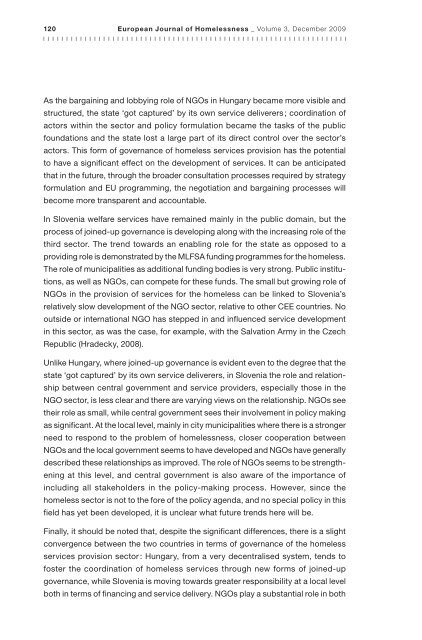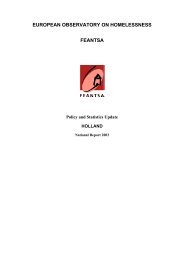Part A - Feantsa - Horus
Part A - Feantsa - Horus
Part A - Feantsa - Horus
You also want an ePaper? Increase the reach of your titles
YUMPU automatically turns print PDFs into web optimized ePapers that Google loves.
120 European Journal of Homelessness _ Volume 3, December 2009<br />
As the bargaining and lobbying role of NGOs in Hungary became more visible and<br />
structured, the state ‘got captured’ by its own service deliverers ; coordination of<br />
actors within the sector and policy formulation became the tasks of the public<br />
foundations and the state lost a large part of its direct control over the sector’s<br />
actors. This form of governance of homeless services provision has the potential<br />
to have a significant effect on the development of services. It can be anticipated<br />
that in the future, through the broader consultation processes required by strategy<br />
formulation and EU programming, the negotiation and bargaining processes will<br />
become more transparent and accountable.<br />
In Slovenia welfare services have remained mainly in the public domain, but the<br />
process of joined-up governance is developing along with the increasing role of the<br />
third sector. The trend towards an enabling role for the state as opposed to a<br />
providing role is demonstrated by the MLFSA funding programmes for the homeless.<br />
The role of municipalities as additional funding bodies is very strong. Public institutions,<br />
as well as NGOs, can compete for these funds. The small but growing role of<br />
NGOs in the provision of services for the homeless can be linked to Slovenia’s<br />
relatively slow development of the NGO sector, relative to other CEE countries. No<br />
outside or international NGO has stepped in and influenced service development<br />
in this sector, as was the case, for example, with the Salvation Army in the Czech<br />
Republic (Hradecky, 2008).<br />
Unlike Hungary, where joined-up governance is evident even to the degree that the<br />
state ‘got captured’ by its own service deliverers, in Slovenia the role and relationship<br />
between central government and service providers, especially those in the<br />
NGO sector, is less clear and there are varying views on the relationship. NGOs see<br />
their role as small, while central government sees their involvement in policy making<br />
as significant. At the local level, mainly in city municipalities where there is a stronger<br />
need to respond to the problem of homelessness, closer cooperation between<br />
NGOs and the local government seems to have developed and NGOs have generally<br />
described these relationships as improved. The role of NGOs seems to be strengthening<br />
at this level, and central government is also aware of the importance of<br />
including all stakeholders in the policy-making process. However, since the<br />
homeless sector is not to the fore of the policy agenda, and no special policy in this<br />
field has yet been developed, it is unclear what future trends here will be.<br />
Finally, it should be noted that, despite the significant differences, there is a slight<br />
convergence between the two countries in terms of governance of the homeless<br />
services provision sector : Hungary, from a very decentralised system, tends to<br />
foster the coordination of homeless services through new forms of joined-up<br />
governance, while Slovenia is moving towards greater responsibility at a local level<br />
both in terms of financing and service delivery. NGOs play a substantial role in both




